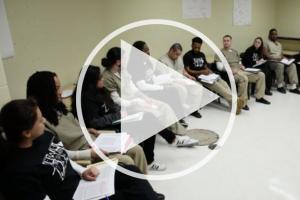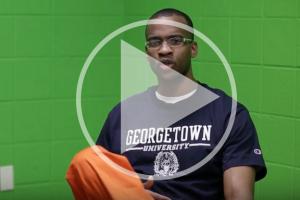
By: Caitlin Morneau
If you’re familiar with restorative justice, you’ve probably heard about victim-offender dialogue, where individuals involved in the same or a similar crime, come together to discuss how the incident impacted their lives and deep needs that it created. Or, perhaps you’ve had the opportunity to experience a peacemaking circle, a versatile and spiritual process rooted in indigenous traditions that can be used to address harm and conflict, but also to build community or share in prayer.
Knowledgeable about these foundational practices, DePaul University in Chicago and Georgetown University in Washington, DC developed programs that create transformational encounter amongst incarcerated individuals, traditional students and faculty. Together, they study topics like English literature, theater, and religion, and have the opportunity to discuss how these subject areas relate to their lives and experiences.
Through these programs, students not only gain new knowledge, but create genuine connections rooted in human dignity, solidarity, and redemption. All those involved build skills and relationships that inspire meaningful participation in society.
Georgetown University recently hosted lecture on social sciences in which Charles King, Professor and Department of Government Chair, discussed the phenomenon of group categorization. Following the lecture, one student, Joel, remarked “Here, in jail, we are categorized as inmates, but in class, we are not inmates or prisoners, we are scholars.”
Building a culture of life, as Pope Francis calls us to, will require many more encounters like Georgetown and DePaul are making possible. May we seek out such opportunities in our own communities to honor one another's God-given dignity and take action to transform our broken criminal justice into one of redemption and restoration.
Click on the images to watch short videos and hear more from those involved in the programs.





